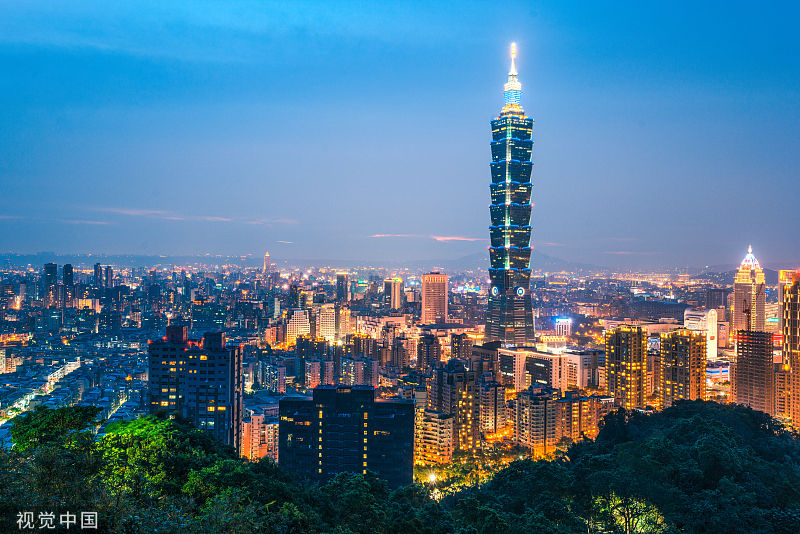Cross-Straits bonds boon for Taiwan


The forecast by the Taiwan Institute of Economic Research that the island's exports and investments will further slow down in 2023 is worrying. Economists say Taiwan's economy is likely to grow by 2.91 percent in 2023, which means the island will fail to achieve its goal of maintaining 3 percent economic growth.
Amid all this, however, Taiwan's trade with the Chinese mainland has grown substantially. The customs figures show that overall cross-Straits trade in 2022 was $319.68 billion, with the island's exports to the mainland adding up to $238.09 billion and imports from the mainland to $81.59 billion.
And data from Taiwan's finance authorities show that cross-Straits ties are far closer than those between Washington and Taipei. In the first 10 months of this year, for instance, the value of Taiwan's exports to the mainland and the Hong Kong Special Administrative Region exceeded that to the United States by about $94.57 billion.
Washington always wanted to drive a wedge between the two sides of the Straits. But last year, the US crossed the redline on the Taiwan question. Among its most provocative moves were the unannounced transit of the Burke-class guided-missile destroyer USS Benfold (DDG-65) through the Taiwan Straits and then House speaker Nancy Pelosi's reckless visit to Taiwan in August.
But despite all the US' provocative moves, which Taiwan politicians were complicit in, the mainland puts Taiwan's economy first. In the report to the 20th National Congress of the Communist Party of China, Taiwan has been mentioned 13 times, and two of the report's 15 chapters mention the Taiwan question.
On Taiwan's economy, the report, in the 13th chapter, says the mainland will continue to promote cross-Straits economic and cultural exchanges. It also proposes to strengthen trade and cultural exchanges across the Straits to "benefit Taiwan compatriots".
Following Pelosi's visit to Taiwan in August, Beijing released a white paper titled "The Taiwan Question and China's Reunification in the New Era" which, in unequivocal terms, said that efforts will be made to promote peaceful and integrated development across the Straits. The white paper also proposed that the two sides continue to boost cross-Straits trade, strengthen cross-Straits economic cooperation and build a common market across the Straits to boost the economy of the Chinese nation.
The economies of the two sides are highly complementary. And since Taiwan has a higher per capita GDP, distinctive industries and developed foreign trade, it will have unrestricted access to the mainland's vast market, can stabilize its industrial and supply chains, and become more competitive and innovative after national reunification.
Besides, the problems plaguing Taiwan's economy will be also resolved through the integration of the two sides.
Taiwan should realize that returning to the motherland is the best way to boost its economy and improve the lives and livelihoods of Taiwan residents, especially because the report to the 20th CPC National Congress made it clear that the mainland will never rule out the use of force to resolve the Taiwan question.
It is more than clear that the mainland has been sharing the fruits of its development with Taiwan. For instance, from August to October 2022, Taiwan's exports to the mainland and Hong Kong were about $15.11 billion, $15.17 billion, and $14.72 billion respectively. But some Western media and politicians deliberately misinterpreted the small fluctuations to claim Taiwan's exports to the mainland and Hong Kong show "negative growth for three consecutive months".
Separated by a narrow strip of water, the two sides of the Straits are related by flesh and blood. The mainland has been a strong supporter of Taiwan. While the mainland's economy has continued its strong recovery, with its GDP in 2022 reaching 121 trillion yuan ($17.83 trillion), up 3 percent year-on-year, Taiwan's economy is export-oriented and heavily dependent on the mainland.
Back in August, to preempt any pro-independence moves by Taiwan politicians in the aftermath of Pelosi's visit, the mainland conducted live-fire drills around, and blockaded, Taiwan, showing that Beijing is capable of not only helping Taiwan achieve greater prosperity, but also bringing the island's economy to a standstill by laying siege to it.
Taiwan's economy has been benefiting from the mainland but the Taiwan authorities do the US' bidding. There is an old Chinese saying that "a filial son is born under a stick", and the pro-independence Taiwan authorities shouldn't forget that.
The author is head of the Institute of Taiwan Economics, Central University of Finance and Economics.
The views don't necessarily represent those of China Daily.

































